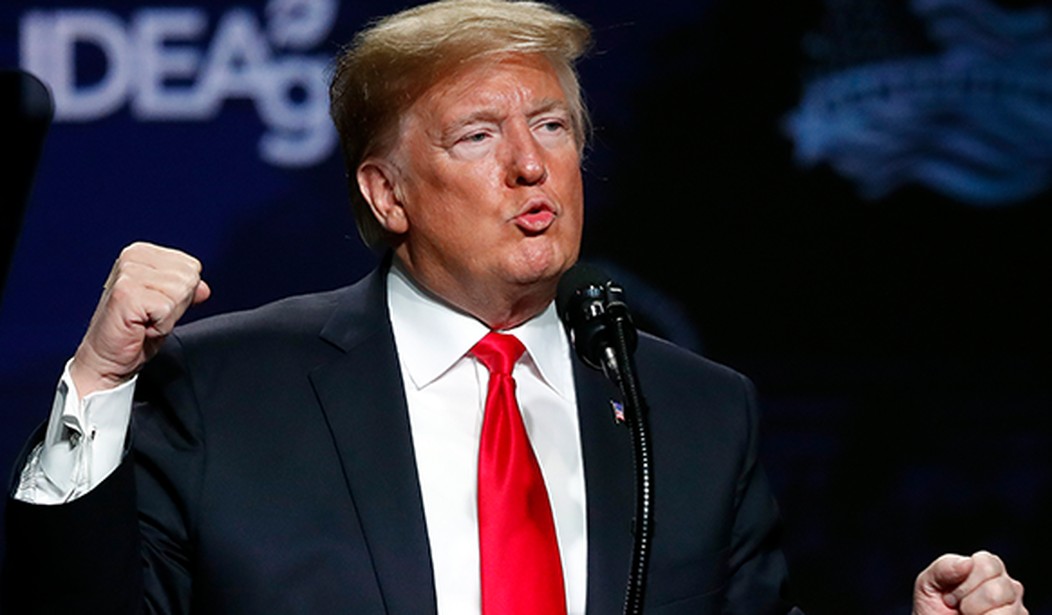With the political commentariat still in the throes of acute Mueller Mania (Sunday may have been one of the best days of Trump's presidency, from his perspective), I figured I'd offer up a little bit of counter-programming. Some attention was paid last week to a series of political models rely exclusively rely on economic indicators to predict presidential election outcomes. Based on the present conditions in the US economy, President Trump is currently projected to win re-election...in every single model. That's pretty extraordinary. How the numbers look 18 months from now will obviously be far more potentially-determinative, of course (more on that below), but this is an interesting data point that can't easily be ignored:
Moody’s Analytics has run 12 different models combining economic and political data. @realDonaldTrump win re-election in all of them. Mostly by a lot. Me and @POLITICO_Steve https://t.co/9Ni8sSlefM
— Ben White (@morningmoneyben) March 21, 2019
Trump's economic approval rating is much stronger than his overall performance, which makes sense: A recent CNN poll showed that 71 percent of Americans say the economy is in "good" shape right now. And some positive developments continue to unfold. Consider the following bulletins from two key battleground states that helped kick down the Democrats' blue wall in 2016. First, a Trump campaign official excitedly shared this news out of Michigan:
JOBS! JOBS! JOBS! Auto jobs originally planned outside of country are now coming to Michigan thanks to President @RealDonaldTrump https://t.co/vfVfcqmpck
— Marc Lotter (@marc_lotter) March 22, 2019
General Motors is making a $300 million investment at its Orion Assembly Plant in Michigan and adding 400 jobs to build a new electric vehicle, the automaker said Friday. The investment is a portion of the $1.8 billion GM pledged to spend on manufacturing in the U.S., which will create 700 new jobs and support a further 28,000 jobs across six states, the company said...GM had originally intended to build the new vehicle outside the U.S.
Recommended
GM recently endured withering (and inappropriate, in my view) criticism from Trump over their decision to close a plant in Ohio, although not all of the jobs affected were jobs lost. Meanwhile, in Pennsylvania:
This is huge news https://t.co/uVtdmvYTy4
— Charles V Payne (@cvpayne) March 23, 2019
If you go to Sheetz so much you feel like you should work there, now’s your chance. The Altoona-based convenience store chain announced Thursday it is planning to hire more than 2,500 employees, including more than 1,100 in Pennsylvania. Open interviews for the full- and part-time positions will be held from 8 a.m. to 8 p.m. on Wednesday, March 27 at all of the company’s 589 locations in six states, which also includes Maryland, Virginia, Ohio, West Virginia and North Carolina. Sheetz has ranked No. 85 on Fortune magazine’s list of 100 Best Places to Work for in America.
Employment gains are welcome anywhere, of course, but I can't imagine the president's team is disappointed to see news like this impacting communities in Michigan, Pennsylvania, Virginia, Ohio and North Carolina. If only they could also drive home the reality that, contrary to widely-held misconceptions, the overwhelming majority of families and small businesses received a tax cut under the GOP-passed law. The 2020 election is a long way off, and some reddish states in the South and Southwest may be in play for Democrats, based on 2018 results, but Trump is thus far looking at least competitive -- if not resilient -- in the upper midwest, where Democrats made major 2018 gains:
According to a recent opinion survey from The Wall Street Journal, the president “cumulatively leads a generic Democratic opponent, 46 percent to 40 percent,” in Pennsylvania, Indiana, Michigan, Ohio and Wisconsin.
In a new Wisconsin poll, Trump is tied or just slightly behind hypothetical Democratic challengers, performing worst against Joe Biden. If the Democratic Party keeps sprinting left, ISIS remains territorially defeated, Trump is effectively cleared by Mueller, and the economy remains robust, the incumbent will have a very serious shot at another term -- even if his general popularity remains mediocre to weak. But will the economic boom last? Maybe, but there are some mixed signals on that front that Trump's campaign will be watching anxiously. I'll leave you with one of them:
The 1 vs. 10-year US Treasury yield inverted today. The last seven times it did so, an official recession began in the US btwn 5 & 24 months thereafter. Since I have data in 1962, there was one time, 1965-67 that it went inverted & back to clear carry & w/o a recession.
— Ryan Fazio (@ryanfazio) March 22, 2019

























Join the conversation as a VIP Member